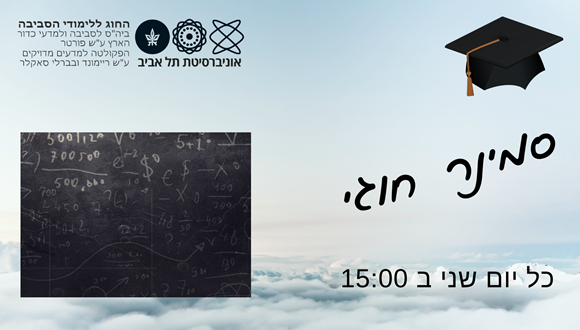סמינר Israel is Drying: Depoliticisation of Drought Resilience Discourse in Israeli Newspapers and Governmental Campaigns [2001-2018]
הסמינר החוגי ביום שני ה 10/5 בשעה 15:00.
Zoom link: https://us02web.zoom.us/j/84947109696?pwd=S2xzVlRTaXlGeHVRYkVZS0dxcU1aQT09
Title: "Israel is Drying": Depoliticisation of Drought Resilience Discourse in Israeli Newspapers and Governmental Campaigns [2001-2018]
Speaker: Dr Shai Kassirer is a researcher at the Centre for Spatial, Environmental and Cultural Politics at the University of Brighton, UK, where he also conducted his PhD research. Dr Kassirer has a Masters in Environmental Studies frםm Tel-Aviv University (Porter), and serves as the Vice-Chair of the Science and Environment Communication Section of the European Communication Research and Education Association (ECREA).
Summary: As the impacts of climate change accelerate, Israel has experienced three long droughts since the turn of the century: 1999-2001, 2004-2011 and 2014-2017. In response to this recurring water scarcity, seawater desalination (SD, technology removing minerals from saline water, making it suitable for human consumption and irrigation) now supplies 80% of the country’s household water consumption. Whilst promising steady water supplies, SD is a particular technology and hydro-policy that has long-term environmental, health, economic, national-political and geopolitical implications (Netanyahu 2017; Feitelson and Rosenthal 2012; Swyngedouw and Williams 2016).
This presentation is based on a doctorate research which applies a resilience perspective (McGreavy 2016; Moser 2017) to investigate the historical development of hydro-policies discourse in Israel. It analyses how, over an eighteen-year period (2001-2018), Israeli newspapers and governmental public communication campaigns (PCCs) discursively represented the drought risks and the hydro-policies promoted to solve them, particularly the debate on SD as the preferred resilience policy. This presentation is bringing together two longitudinal methods to critically evaluate the discursive role of the media as contributing to the (de)politicisation of the hydro-policy debate and SD. The first method is a critical discourse analysis of newspapers concentrated on pre-identified critical discourse periods, one for each drought (2001-2002, n=432; 2008-2010, n=377; 2018, n=127), which coincide with periods of formal governmental inquiry into hydro-policies. Selected newspapers in Hebrew are: Haaretz and Yedioth Aharonoth and their economic sub-papers TheMarker and Calcalist. The second method is a multimodal discourse analysis of videos from nine PCCs produced by the Israel Water Authority to reduce household water consumption (2008-2018, n=35).
Findings showed that in every period, newspapers framed the drought as a “water crisis” due to “governmental failure-to-act” and a supply and demand imbalance, with the connection to climate change marginalised and questioned. While delegitimising political disagreements between the contesting discourse-coalitions (Agro-Zionist, Economic, Environmental and Social-Municipal), the newspapers generated a consensus around the continual expansion of privatised SD. Furthermore, the longitudinal findings reveal the expansion of techno-managerial, expert-based discourses in the newspapers, which became hegemonic over time, mainly in the form of economisation. The multimodal video analysis shows how the PCCs audio-visually reaffirmed the “crisis” frame and strengthened its depoliticisation, but in a different way: by making the issue an ethical-individual one. Finally, in both mediums, the scope of the discourse on resilience was limited to drought risk and not wider anthropogenic climate impacts, neglecting the relationship between SD and climate change.


